UNit3(牛津英语)
Unit3知识点梳理牛津译林版英语八年级上册
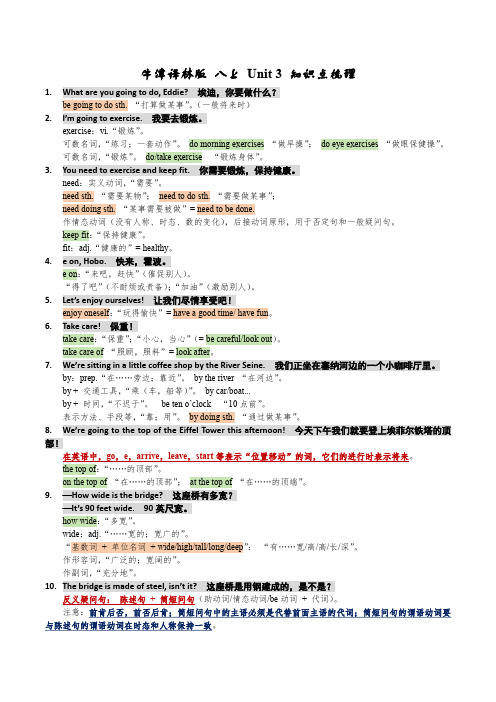
牛津译林版八上Unit 3 知识点梳理1.What are you going to do, Eddie? 埃迪,你要做什么?be going to do sth. “打算做某事”。
(一般将来时)2.I’m going to exercise. 我要去锻炼。
exercise:vi.“锻炼”。
可数名词,“练习;一套动作”。
do morning exercises “做早操”;do eye exercises “做眼保健操”。
可数名词,“锻炼”。
do/take exercise “锻炼身体”。
3.You need to exercise and keep fit. 你需要锻炼,保持健康。
need:实义动词,“需要”。
need sth. “需要某物”;need to do sth. “需要做某事”;need doing sth. “某事需要被做”= need to be done.作情态动词(没有人称、时态、数的变化),后接动词原形,用于否定句和一般疑问句。
keep fit:“保持健康”。
fit:adj.“健康的”= healthy。
4. e on, Hobo. 快来,霍波。
e on:“来吧,赶快”(催促别人)。
“得了吧”(不耐烦或责备);“加油”(激励别人)。
5.Let’s enjoy ourselves! 让我们尽情享受吧!enjoy oneself:“玩得愉快”= have a good time/ have fun。
6.Take care! 保重!take care:“保重”;“小心,当心”(= be careful/look out)。
take care of “照顾,照料”= look after。
7.We’re sitting in a little coffee shop by the River Seine. 我们正坐在塞纳河边的一个小咖啡厅里。
by:prep.“在……旁边;靠近”。
牛津英语模块一unit3重点词汇讲解

牛津英语M1U3 重点词汇讲解1.make 后接名词、形容词、省略to 的动词不定式或过去分词等作宾补。
例如:The workers made him head of the workshop. 工人们选他当车间主任。
A heavy rain made the road rather slippery. 一场大雨使道路相当滑。
He began to make faces just in order to make the other students laugh.I raised my voice to make myself heard. 我进步声音为的是让别人听见我的话。
2.stay 保持,是系动词,后接形容词,副词,介词。
〔注意和remain与keep的区别〕The weather has stayed warm all week.stay up 不睡觉、熬夜stay in 呆在家里stay still 静止不动3.be dying to do=have a strong desire to do=be anxious / eager to do sth. 常用于口语,意为“很想做某事〞或“渴望做某事〞。
例:I’m dying to see you. 我渴望见到你。
There was a time when many young people were dying to go abroad.类似的短语有be thirsty for sth.(渴望得到某物),long for sth.(渴望得到某物),expect to do sth. (期望做某事),wish to do sth.(希望做某事),hope to do sth.(希望做某事)。
be dying for somethingHe is dying for a cigarette. 他很想要香烟。
She is dying for a cup of coffee. 她很想要一杯咖啡4.hear form 与hear of/about①hear from sb.= receive one’s letter / telephone 意为“收到某人的来信/ 〞。
Unit3课文翻译2024-2025学年新牛津译林版英语七年级上册
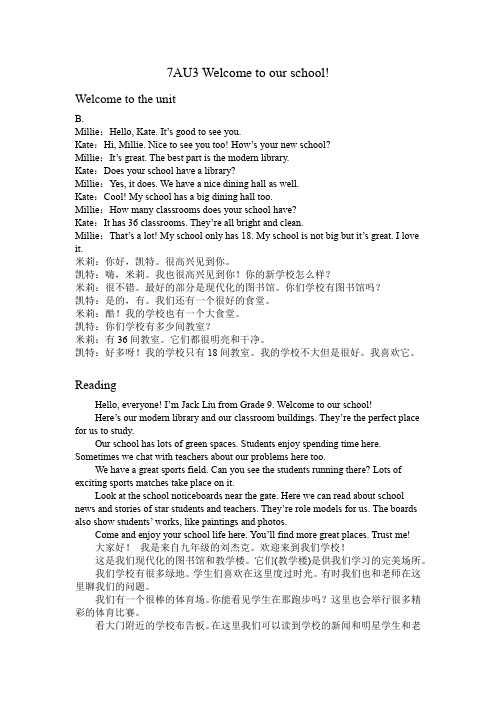
7AU3 Welcome to our school!Welcome to the unitB.Millie:Hello, Kate. It’s good to see you.Kate:Hi, Millie. Nice to see you too! How’s your new school?Millie:It’s great. The best part is the modern library.Kate:Does your school have a library?Millie:Yes, it does. We have a nice dining hall as well.Kate:Cool! My school has a big dining hall too.Millie:How many classrooms does your school have?Kate:It has 36 classrooms. They’re all bright and clean.Millie:That’s a lot! My school only has 18. My school is not big but it’s great. I love it.米莉:你好,凯特。
很高兴见到你。
凯特:嗨,米莉。
我也很高兴见到你!你的新学校怎么样?米莉:很不错。
最好的部分是现代化的图书馆。
你们学校有图书馆吗?凯特:是的,有。
我们还有一个很好的食堂。
米莉:酷!我的学校也有一个大食堂。
凯特:你们学校有多少间教室?米莉:有36间教室。
它们都很明亮和干净。
凯特:好多呀!我的学校只有18间教室。
我的学校不大但是很好。
我喜欢它。
ReadingHello, everyone! I’m Jack Liu from Grade 9. Welcome to our school!Here’s our modern library and our classroom buildings. They’re the perfect place for us to study.Our school has lots of green spaces. Students enjoy spending time here. Sometimes we chat with teachers about our problems here too.We have a great sports field. Can you see the students running there? Lots of exciting sports matches take place on it.Look at the school noticeboards near the gate. Here we can read about school news and stories of star students and teachers. They’re role models for us. The boards also show students’ works, like paintings and photos.Come and enjoy your school life here. You’ll find more great places. Trust me!大家好!我是来自九年级的刘杰克。
上海版牛津英语七年级 上 unit3单元知识点及练习

复习unit3 单词、短语、重点句子和语法一、单词:核心词汇名词可数名词field — a field — two fieldsquiz — a quiz —three quizzesa ground — four groundsland — a land — two landsproblem — a problem — four problemsFact — a fact — several facts不可数名词the Earth(地球)— the Moon(月亮) — the Sun(太阳)pollution(n.)— pollute(v.)=make sth dirtyenergy (n.) — clean energy(清洁能源)— heat energy(热能)二、短语/固定搭配:1、短语:provide …with…put…into…find out throw awaybe covered by on earthin the sky a lot ofmake energy of coursefor example one quarterthree quarters at hometake a look come fromfind out different types ofin the end get cooler2、固定搭配:call sth. sth.provide sb. with sth.stop doing sth.it be +形容词+ for sb. +to do sth.let sb. do sth.help sb. do sth.ask sb. (to) do sth.keep sb. + 形容词三、经典句型:There are also many people like you and me on earth.It is important for us to protect the earth for our future.What is the weather like in different places on earth?四、重点短语1.protect the Earth保护地球protect sb/sth from doing我们必须保护那片森林免受火灾。
《Unit-3-Family-members》牛津英语小学三年级(下册)精品课件

Summary:
Is this/that your sister? Yes, it is./No,it isn’t Is Guo Peng/he/she your sister? Yes, he/she is./No, he/she isn’t.
father
mother
These are my parents. parents
That’s my sister. And those are my brothers.
sister
brothers
That is my grandmother.
Байду номын сангаас
grandmother
That is my grandfather.
6.grandfather
e
7.friend a
8.grandparents
d
9.sister
f
Mike Brown
This is his mother. These are his parents. This is his father.
This is his… These are his grandparents.
grandfather
Those are my grandparents.
grandparents
These are my friends. friends
sister
grandfather grandmother grandparents
father mother parents
friends
He’s my son.
牛津上海版七年级英语上册Unit3知识点讲义
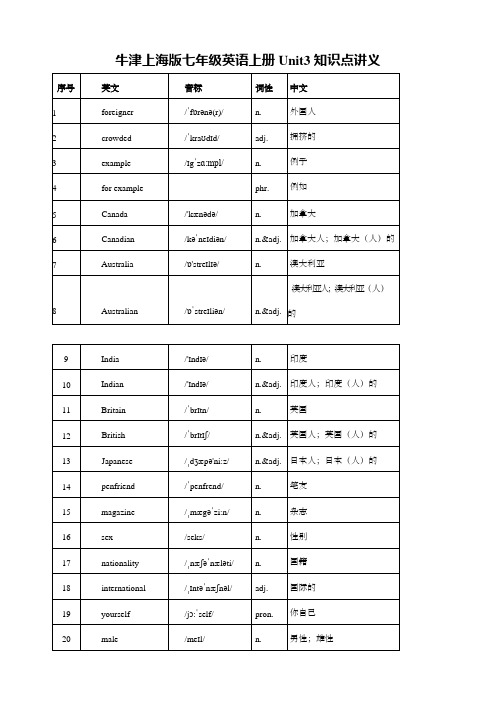
牛津上海版七年级英语上册Unit3知识点讲义知识点梳理eful words and expressions1. Garden City is a crowded city.➢be crowded with=be full of2. Over six million people live in Garden City.➢over =more than➢当表示确切的数目时,hundred, thousand, million等数词前用单数形式。
当表达不具体的数目,如成百上千,成千上万等时,hundrend, thousand等数词用复数形式,且在其后加介词of。
[e.g.] Hundred of visitors came to Shanghai every year.3. For example, there are more than twenty-eight thousand people from Canada in Garden city.➢for example一般只举同类人或物中的“一个”为例,作插入语,用逗号隔开,可置于句首、句中、句末。
[e.g.] Noise,for example,is a kind of pollution.4. —What do we call people from Canada?— We call them Canadians.➢call意为“把…称作”➢注意国家和国籍的不同表达:[e.g.] He is a boy from Canada. = The boy comes from Canada. = The boy is Canadian.➢本课已出现的及常见的国名、国籍和国名列表如下:5. Nowadays we can visit countries near or far away from China.➢near作形容词,表示1)"邻近的,接近的"。
Unit3单词讲解牛津译林英语七年级下册

1.mine [maɪn] pron.我的o例句:That book is mine. 那本书是我的。
2.nothing [nʌθɪŋ] pron.没有什么o固定搭配:for nothing 免费;徒然o例句:He has nothing to fear. 他没有什么可害怕的。
3.wait a minute [weɪt əmɪnɪt] 等一会儿=just a momento例句:Wait a minute, I'll be right back. 等一下,我马上回来。
4.yuan [jʊɑːn] n.元(人民币单位)o例句:The price is 100 yuan. 价格是100元。
5.tin [tɪn] n.罐,听a tin of 一听...o例句:Can you open this tin of tuna? 你能打开这罐金枪鱼吗?6.pizza [piːtsə] n.比萨饼o例句:I love pizza with lots of cheese. 我喜欢有很多奶酪的比萨饼。
7.exchange student [ɪks tʃeɪndʒ stjuːdənt] n.交流学生an exchangestudento例句:He is an exchange student from France. 他是来自法国的交流学生。
8.quiet [kwaɪət] adj.安静的;寂静的o固定搭配:keep quiet 保持安静o例句:The library is very quiet. 图书馆很安静。
9.air [eə] n.空气,大气o固定搭配:fresh air 新鲜空气o例句:We need clean air to breathe. 我们需要干净的空气来呼吸。
10.fresh [freʃ] adj.新鲜的fresh air新鲜空气o例句:I like fresh fruits and vegetables. 我喜欢新鲜的水果和蔬菜。
牛津译林版新教材高中英语必修一unit3课文及翻译
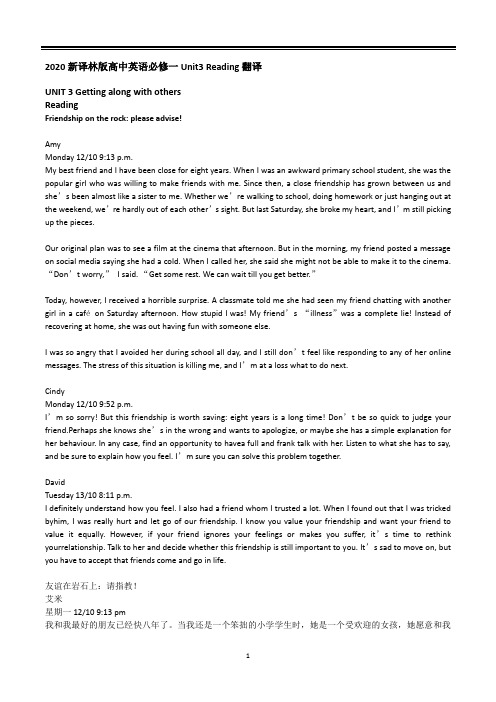
2020新译林版高中英语必修一Unit3 Reading翻译UNIT 3 Getting along with othersReadingFriendship on the rock: please advise!AmyMonday 12/10 9:13 p.m.My best friend and I have been close for eight years. When I was an awkward primary school student, she was the popular girl who was willing to make friends with me. Since then, a close friendship has grown between us and she’s been almost like a sister to me. Whether we’re walking to school, doing homework or just hanging out at the weekend, we’re hardly out of each other’s sight. But last Saturday, she broke my heart, and I’m still picking up the pieces.Our original plan was to see a film at the cinema that afternoon. But in the morning, my friend posted a message on social media saying she had a cold. When I called her, she said she might not be able to make it to the cinema. “Don’t worry,”I said.“Get some rest. We can wait till you get better.”Today, however, I received a horrible surprise. A classmate told me she had seen my friend chatting with another girl in a caféon Saturday afternoon. How stupid I was! My friend’s “illness”was a complete lie! Instead of recovering at home, she was out having fun with someone else.I was so angry that I avoided her during school all day, and I still don’t feel like responding to any of her online messages. The stress of this situation is killing me, and I’m at a loss what to do next.CindyMonday 12/10 9:52 p.m.I’m so sorry! But this friendship is worth saving: eight years is a long time! Don’t be so quick to judge your friend.Perhaps she knows she’s in the wrong and wants to apologize, or maybe she has a simple explanation for her behaviour. In any case, find an opportunity to havea full and frank talk with her. Listen to what she has to say, and be sure to explain how you feel. I’m sure you can solve this problem together.DavidTuesday 13/10 8:11 p.m.I definitely understand how you feel. I also had a friend whom I trusted a lot. When I found out that I was tricked byhim, I was really hurt and let go of our friendship. I know you value your friendship and want your friend to value it equally. However, if your friend ignores your feelings or makes you suffer, it’s time to rethink yourrelationship. Talk to her and decide whether this friendship is still important to you. It’s sad to move on, but you have to accept that friends come and go in life.友谊在岩石上:请指教!艾米星期一12/10 9:13 pm我和我最好的朋友已经快八年了。
牛津英语9A Unit3单词讲解
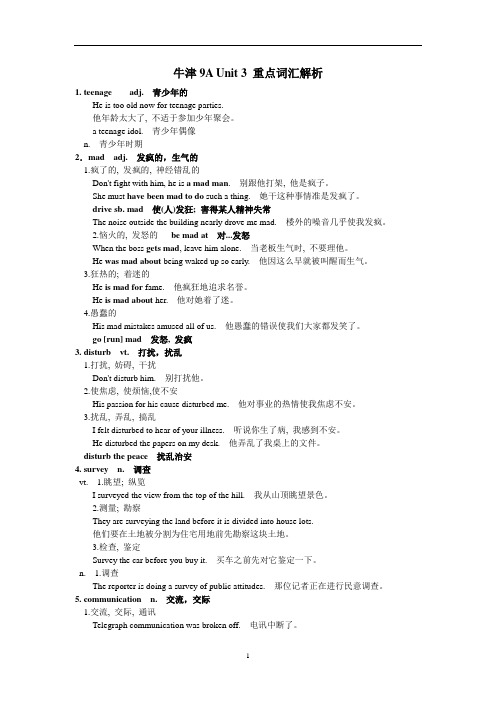
牛津9A Unit 3 重点词汇解析1. teenage adj. 青少年的He is too old now for teenage parties.他年龄太大了, 不适于参加少年聚会。
a teenage idol. 青少年偶像n. 青少年时期2.mad adj. 发疯的,生气的1.疯了的, 发疯的, 神经错乱的Don't fight with him, he is a mad man. 别跟他打架, 他是疯子。
She must have been mad to do such a thing. 她干这种事情准是发疯了。
drive sb. mad 使(人)发狂; 害得某人精神失常The noise outside the building nearly drove me mad. 楼外的噪音几乎使我发疯。
2.恼火的, 发怒的be mad at 对...发怒When the boss gets mad, leave him alone. 当老板生气时, 不要理他。
He was mad about being waked up so early. 他因这么早就被叫醒而生气。
3.狂热的; 着迷的He is mad for fame. 他疯狂地追求名誉。
He is mad about her. 他对她着了迷。
4.愚蠢的His mad mistakes amused all of us. 他愚蠢的错误使我们大家都发笑了。
go [run] mad 发怒, 发疯3. disturb vt. 打扰,扰乱1.打扰, 妨碍, 干扰Don't disturb him. 别打扰他。
2.使焦虑, 使烦恼,使不安His passion for his cause disturbed me. 他对事业的热情使我焦虑不安。
3.扰乱, 弄乱, 搞乱I felt disturbed to hear of your illness. 听说你生了病, 我感到不安。
Unit 3 精选短语和词汇(预习+复习+默写)2021-2022学年牛津版英语九年级上册
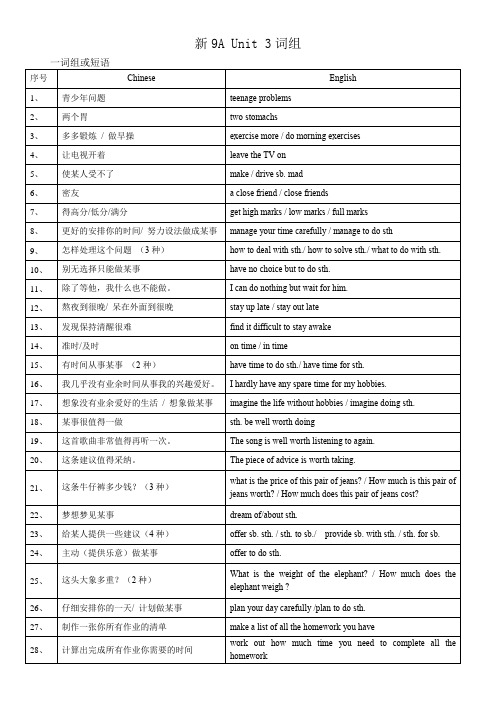
计算出完成所有作业你需要的时间
work out how much time you need to complete all the homework
29、
这将让你知道(了解)你拥有多少空闲时间。
This will give you an idea of how much spare time you have.
17
值得做某事(词组)
47
提及;说起(vt.)
18
建议(n.)
48
不客气(词组)
19
原因(n.)
49
精神压力,紧张(n.)
20
严格的,严厉的(adj.)
50
与···同龄的(词组)
21
对某人要求严格(词组)
51
22
呆在户外;(晚上)不回家(词组)
52
23
课业(n.)
53
24
宝贵的;贵重的(adj.)
54
怎样处理这个问题 (3种)
10、
别无选择只能做某事
11、
除了等他,我什么也不能做。
12、
熬夜到很晚/ 呆在外面到很晚
13、
发现保持清醒很难
14、
准时/及时
15、
有时间从事某事 (2种)
16、
我几乎没有业余时间从事我的兴趣爱好。
17、
想象没有业余爱好的生活 / 想象做某事
18、
某事很值得一做
19、
这首歌曲非常值得再听一次。
42、
为某人某事担心/ 某事使某人担心/ 把担忧放在心底
43、
表达自己有困难
44、
回复我的信/ 没有回复
45、
别去在意那些嘲笑你的人
牛津译林版八年级英语上册Unit3语法重点总结

牛津译林版八年级英语上册Unit3语法重点总结一、一般现在时 (Simple Present Tense)- 表示经常性的动作、惯或事实- 常用的时间状语:always, usually, often, sometimes, everyday/week/month/year二、一般过去时 (Simple Past Tense)- 表示过去发生的动作或状态- 常用的时间状语:yesterday, last week/month/year, in 2010, etc.三、现在进行时 (Present Continuous Tense)- 表示现在正在进行的动作- 结构:主语 + am/is/are + 动词的现在分词 (-ing)- 常用的时间状语:now, at the moment, currently, etc.四、过去进行时 (Past Continuous Tense)- 表示过去某个时间正在进行的动作- 结构:主语 + was/were + 动词的现在分词 (-ing)- 常用的时间状语:at that time, while, etc.五、一般将来时 (Simple Future Tense)- 表示将来发生的动作或情况- 结构:主语 + will + 动词原形- 常用的时间状语:tomorrow, next week/month/year, in the future, etc.六、现在完成时 (Present Perfect Tense)- 表示过去发生的动作对现在产生的影响或结果- 结构:主语 + have/has + 动词的过去分词- 常用的时间状语:already, yet, so far, recently, etc.七、过去完成时 (Past Perfect Tense)- 表示过去某个时间或动作之前已经完成的动作- 结构:主语 + had + 动词的过去分词- 常用的时间状语:before, after, by the time, etc.八、将来完成时 (Future Perfect Tense)- 表示将来某个时间之前已经完成的动作- 结构:主语 + will have + 动词的过去分词- 常用的时间状语:by next week/month/year, etc.九、情态动词 (Modal Verbs)- 表示能力、可能性、允许性、必要性等- 常用的情态动词:can, could, may, might, must, shall, should, ought to, will, would以上是牛津译林版八年级英语上册Unit 3的语法重点总结。
牛津英语初三Unit 3 语法详解与练习(不定式的结构)
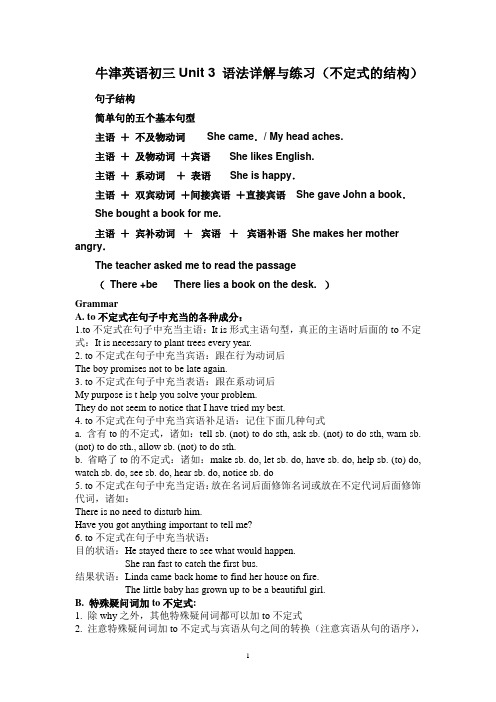
牛津英语初三Unit 3 语法详解与练习(不定式的结构)句子结构简单句的五个基本句型主语+不及物动词She came./ My head aches.主语+及物动词+宾语She likes English.主语+系动词+表语She is happy.主语+双宾动词+间接宾语+直接宾语She gave John a book.She bought a book for me.主语+宾补动词+宾语+宾语补语She makes her mother angry.The teacher asked me to read the passage(There +be There lies a book on the desk. )GrammarA. to不定式在句子中充当的各种成分:1.to不定式在句子中充当主语:It is形式主语句型,真正的主语时后面的to不定式:It is necessary to plant trees every year.2. to不定式在句子中充当宾语:跟在行为动词后The boy promises not to be late again.3. to不定式在句子中充当表语:跟在系动词后My purpose is t help you solve your problem.They do not seem to notice that I have tried my best.4. to不定式在句子中充当宾语补足语:记住下面几种句式a. 含有to的不定式,诸如:tell sb. (not) to do sth, ask sb. (not) to do sth, warn sb. (not) to do sth., allow sb. (not) to do sth.b. 省略了to的不定式:诸如:make sb. do, let sb. do, have sb. do, help sb. (to) do, watch sb. do, see sb. do, hear sb. do, notice sb. do5. to不定式在句子中充当定语:放在名词后面修饰名词或放在不定代词后面修饰代词,诸如:There is no need to disturb him.Have you got anything important to tell me?6. to不定式在句子中充当状语:目的状语:He stayed there to see what would happen.She ran fast to catch the first bus.结果状语:Linda came back home to find her house on fire.The little baby has grown up to be a beautiful girl.B. 特殊疑问词加to不定式:1. 除why之外,其他特殊疑问词都可以加to不定式2. 注意特殊疑问词加to不定式与宾语从句之间的转换(注意宾语从句的语序),诸如:1. Simon just forgot when to meet his friends.=Simon just forgot when he could meet his friends.2. Sandy wants to know where to ask for advice.=Sandy wants to know where she can ask for advice.C. 四大句型:陈述句(肯定、否定);疑问句(一般疑问句,特殊疑问句,选择疑问句,反义疑问句);祈使句;感叹句特别注意:有时选择疑问句不要误认为是一般疑问句或选择疑问句(一)To-infinitives 动词不定式Subject (主语)To plant trees every year is necessary.不定式作主语常能换成形式主语“it”.To eat too much is unhealthy for you.It is unhealthy for you to eat too much.To learn English well is important.It is important to learn English well.我们相信早上读英语是有帮助的.We believe it is helpful to read English in the morning.Predictive (表语)My dream is to be a great football player.不定式作表语,说明主语的内容,性质,特征,能接不定式作表语的名词有: dream, plan, duty, aim, purpose, job 等1. 我的目的是帮助你提高你的英语水平。
Unit3单元重点知识讲解牛津译林版英语七年级上册

七上U3重点知识1.Which subject is your favourite?=Which is your favourite subject?2.one,代指上文提到的同类不同物,但不是同一个人或事(同类不同物)it指上文提到的事物,同类同物3.tell sb about sth =tell sb sth告诉某人某事4.Subjects 科目Art 美术Biology生物Chinese 语文English 英语Geography 地理History历史Maths数学Music音乐PE 体育(学科名首字母大写)5.on the open Day在开放日on+ 星期/日期/节曰/天气,介词短语作状语,位于句子的末尾6.问日期:What's the date today?=What date is it today?问星期几:What day is it today?=What’s the day today?6.show sb sth=show sth to sb把某物展示给某人看show sb around带某人参观7.in front of:外面的前面in the front of:里面的前面。
Eg.There is a big tree in front of our classroom.He is standing in the front of the classroom.8.四个“穿”9.四个花费Spend:Sb spend some time/money on sth/(in)doing sth Take:It/sth takes sb some time to do sthPay:Sb pay some money for sthCost :Sth cost sb some money10.人称代词大表格用法:主格充当主语,宾格用在动词或者介词的后面,形容词物主代词放名词前,名词性物主代词充当名词。
牛津译林版英语七年级下 Unit3 知识点梳理
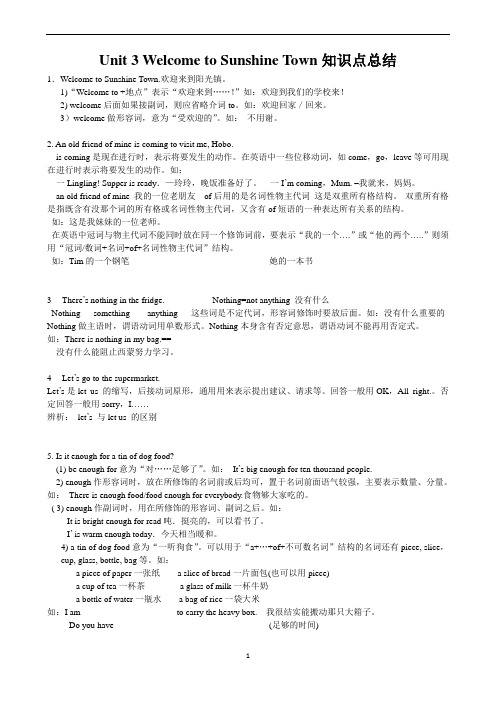
Unit 3 Welcome to Sunshine Town知识点总结1.Welcome to Sunshine Town.欢迎来到阳光镇。
1)“Welcome to +地点”表示“欢迎来到……!”如:欢迎到我们的学校来!2) welcome后面如果接副词,则应省略介词to。
如:欢迎回家/回来。
3)welcome做形容词,意为“受欢迎的”。
如:不用谢。
2. An old friend of mine is coming to visit me, Hobo.is coming是现在进行时,表示将要发生的动作。
在英语中一些位移动词,如come,go,leave等可用现在进行时表示将要发生的动作。
如:一Lingling! Supper is ready.—玲玲,晚饭准备好了。
一I’m coming,Mum. –我就来,妈妈。
an old friend of mine 我的一位老朋友of后用的是名词性物主代词这是双重所有格结构。
双重所有格是指既含有没那个词的所有格或名词性物主代词,又含有of短语的一种表达所有关系的结构。
如:这是我妹妹的一位老师。
在英语中冠词与物主代词不能同时放在同一个修饰词前,要表示“我的一个….”或“他的两个…..”则须用“冠词/数词+名词+of+名词性物主代词”结构。
如:Tim的一个钢笔她的一本书3There’s nothing in the fridge. Nothing=not anything 没有什么Nothing something anything 这些词是不定代词,形容词修饰时要放后面。
如:没有什么重要的Nothing做主语时,谓语动词用单数形式。
Nothing本身含有否定意思,谓语动词不能再用否定式。
如:There is nothing in my bag.==没有什么能阻止西蒙努力学习。
4Let’s go to the supermarket.Let’s是let us 的缩写,后接动词原形,通用用来表示提出建议、请求等。
七年级英语Unit 3 Finding your way牛津版

7B Unit three Finding your way【课文讲解】1. They read a story about robbers in a city in the USA.他们看了一个关于美国一座城市里的盗贼的故事。
tell a story 讲故事 a story about …一个关于……的故事robber n. 强盗rob v. 抢thief n. 小偷steal v. 偷rob sb. of sth. 抢了某人某物steal sth. from sb. 偷了某人某物The robbers robbed me of my wallet. 那些强盗抢了我的钱包。
The thieves stole the money from Susan. 那些小偷偷了Susan的钱。
2. One day they got a call. 一天他们接到了一个。
one day 一天(常用过去式,不可说a day,可以用the other day)get a call 接到一个answer the phone 接3. Help! 救命!help sb. with sth. 在某方面帮助某人get help from sb. 从某人那儿获得帮助want / need help with sth. 在某方面需要帮助help sb. (to) do sth. 帮助某人干某事ask (sb.) for help (向某人)求助with the help of sb. / with one’s help 在某人的帮助下help oneself to sth. 随便吃点什么help sb. to sth. 拿(食物、酒、菜等)给某人Uncle Wang often helps others with their work. 王叔叔经常在工作上帮助别人。
Who can I get help from when I’m in trouble? 当我身处困境时我能向谁求助呢?Peter told me that he needed / wanted some help with his study.Peter告诉我他在学习方面需要些帮助。
Unit3 短语句型默写2024-2025学年新版牛津译林版七年级英语上册

7A Unit 3Welcome to our school ! 重点短语(背诵版)Welcome to the unit1 学校是学习的好地方School is a great/perfect place for learning.一个做某事的好地方a good/great place(for sb.) to do sth. =a good/great place for doing sth.不同的地方different places我想找一个地方来放我的钢琴I want to/would like to find a place to place my piano.2 更了解我们的学校know our school better【good/well→better(比较级)→best(最高级)】【bad/badly/ill→worse(比较级)→worst(最高级)】彼此了解get to know each other彼此讨论它们discuss them with each other 【discussion 名词】3 听一个关于...的介绍listen to an introduction about...【introduce动词】4 想象做某事imagine doing sth.【imagination名词,imaginative形容词】5 见到你真好It is good to see you. 【It is good (for sb.) to do sth.】6一个很棒的体育场/运动场 a great sport s field7 教学楼classroom building = teaching building8 餐厅dining room= dining hall 【dine动词】9也(肯定句句末)as well = too 【either (否定句句末)】10 又明亮又干净bright and clean 【bright=clever=smart】11 你的新学校怎么样?How’s your new school? =What’s your new school like?今天天气怎么样?How’s the weather today?=What’s the weather like today?12 最好的部分是现代图书馆The best part is the modern library.参加take part in= join in13 我的学校不大但是它很好My school is not big but it’s great. 【not...but...】Reading14 楷模,榜样role models【play an important role in..在...种扮演重要角色】15 绿地green spaces 【space 表空地时可数】16 生存空间living space 【space 表空间,太空时不可数= room】17 喜欢在这里度过时光enjoy spending time here18 花费时间/金钱做某事sb.spend time/money (in) doing sth. =sb.spend time/money onsth.=It takes sb. time/money to do sth.19 和老师聊关于我们的问题chat with teachers about our problems20 帮助我们解决问题help us with our problems= help us (to) solve our problems21 看到学生在跑步see the students running 【see sb. doing sth.】22 许多令人激动的运动比赛lots of exciting sports matches23 发生,举行take place = be held 【take place无被动】24 相信我trust me = believe in me25 它们是供我们学习的绝佳场所They’re the perfect places for us to study.26 图书馆是你享受一本好书和安静时光的绝佳场所The library is a perfect place for you to enjoy a wonderful book and some quiet time.阅览室是我们看书的好地方The reading room is a great place for us to read27 孰能生巧Practice makes perfect.练习做某事practise doing sth.28 一条新闻(不可数) a piece of news29 布告牌也展示学生的作品,例如画和照片The boards also show students’ works, like paintings and photos.30 例如,像like = such us 【like→unlike介词,像】31 你最近怎么样?How are you doing?Grammar - Further study32 带她参观学校show her around the school33 教我们英语teach us English 【teach sb.+学科,sb.用宾格】34 有许多像他们这样的好老师have many nice teachers like them35 他们都很善良乐于助人They’re both kind and helpful. 【be helpful to sb.】36 你午饭吃什么?What do you have for lunch?37 你们的体育场怎么样?How/What about your sports filed?38 做某事怎么样?How/What about doing...?39 做运动play sport = do sport40 让我告诉你更多关于我们老师的事Let me tell you more about our teachers.41 告诉某人(不要)做某事tell sb. (not) to do sth.告诉某人关于某事tell sb. about sth.42 七年级一班的班主任the form teacher of Class One,Grade Seven43 向某人问好say hello to him = greet sb.44 等一会wait/just a minute = wait/just a moment = wait for a while45 他这个人怎么样?(问性格)What is he like?46 对我们所有人都好be kind /nice/friendly/good to all of us47 它是一个带有三层楼的灰色大楼It is a grey building with three floors.48 事实上in fact = actually49 成千上万本书thousands of books 【hundreds of 成百上千个】50 一次借三本书borrow three books at a time51 从某人那里借入某物borrow sth. from sb.52 借出某物给某人lend sth. to sb. = lend sb. sth.53 看报纸和杂志read newspapers and magazines54使用互联网去帮助你的学习use the internet to help you with your studies55在顶楼有一个带有电脑的阅览室There is a reading room with computers on the top floor.一个尖子生 a top student在...的顶端at the top of 【at the bottom of... 在...底部】在...脚下at the foot of...56关心,在乎care about57照顾take care of = look after = care for58你还喜欢其他什么?What else do you like?=What other things do you like? 59许多有趣的活动在这儿举行 A lot of interesting events take place here.What do you think of your school?60你认为你的学校怎么样=How do you like/find your school?61感谢你.....Thanks for doing =Thank you for doing62我很开心成为这儿的一个学生I am happy to be a student here.63超过,多余more than = over少于less than64这个店什么时候开门/关门?When does it open/close?它在早上九点开门/关门It opens/closes at nine o’clock in the morning.这个店什么时候是开门的/关门的?When is it open/closed?它从早上9点到下午5点是开门的It is open/closed from 9 a.m. to 5 p.m.它一天开10 个小时It is open for ten hours a day.7A Unit 3Welcome to our school ! 重点短语(默写版)Welcome to the unit1 学校是学习的好地方一个做某事的好地方不同的地方我想找一个地方来放我的钢琴2 更了解我们的学校彼此了解彼此讨论它们3 听一个关于...的介绍4 想象做某事5 见到你真好6一个很棒的体育场/运动场7 教学楼8 餐厅9也(肯定句句末)10 又明亮又干净11 你的新学校怎么样?今天天气怎么样?12 最好的部分是现代图书馆参加13 我的学校不大但是它很好Reading14 楷模,榜样15 绿地16 生存空间17 喜欢在这里度过时光18 花费时间/金钱做某事19 和老师聊关于我们的问题20 帮助我们解决问题21 看到学生在跑步22 许多令人激动的运动比赛23 发生,举行24 相信我25 它们是供我们学习的绝佳场所26 图书馆是你享受一本好书和安静时光的绝佳场所阅览室是我们看书的好地方27 孰能生巧练习做某事28 一条新闻(不可数)29 布告牌也展示学生的作品,例如画和照片30 例如,像31 你最近怎么样?Grammar - Further study 32 带她参观学校33 教我们英语34 有许多像他们这样的好老师35 他们都很善良乐于助人36 你午饭吃什么?37 你们的体育场怎么样?38 做某事怎么样?39 做运动40 让我告诉你更多关于我们老师的事41 告诉某人(不要)做某事告诉某人关于某事42 七年级一班的班主任43 向某人问好44 等一会45 他这个人怎么样?(问性格)46 对我们所有人都好47 它是一个带有三层楼的灰色大楼48 事实上49 成千上万本书50 一次借三本书51 从某人那里借入某物52 借出某物给某人53 看报纸和杂志54使用互联网去帮助你的学习55在顶楼有一个带有电脑的阅览室一个尖子生在...的顶端在...脚下56关心,在乎57照顾58你还喜欢其他什么?59许多有趣的活动在这儿举行60你认为你的学校怎么样61感谢你.....62我很开心成为这儿的一个学生63超过,多余少于64这个店什么时候开门/关门?它在早上九点开门/关门这个店什么时候是开门的/关门的?它从早上9点到下午5点是开门的它一天开10 个小时。
- 1、下载文档前请自行甄别文档内容的完整性,平台不提供额外的编辑、内容补充、找答案等附加服务。
- 2、"仅部分预览"的文档,不可在线预览部分如存在完整性等问题,可反馈申请退款(可完整预览的文档不适用该条件!)。
- 3、如文档侵犯您的权益,请联系客服反馈,我们会尽快为您处理(人工客服工作时间:9:00-18:30)。
Unit 3 Thing I like to do
Period One Teaching contents: Come and play with me.
Come and sing with me. Teaching aims:
1、知识目标:听懂命令并作出正确反应
2、能力目标:提高学生的听说能力。
3、情感目标:教育学生团结同学,共同参与活动。
Difficult and key points: Say the commands Teaching aids: pictures,cassette player
Unit 3 Thing I like to do
Period Two Teaching contents: Let’s talk
Teaching aims:
4、知识目标:学习句型I like to
5、能力目标:提高学生交际能力。
6、情感目标:教育学生热爱学习,全面发展。
Difficult and key points: I like to…
Teaching aids: pictures, cassette player
Unit 3 Thing I like to do
Period Three Teaching contents: Words:play run sleep swim Teaching aims:
7、知识目标:学习单词play run sleep swim
8、能力目标:提高学生认读单词能力。
9、情感目标:教育学生要有广泛的爱好
Difficult and key points: 认读单词
Teaching aids: pictures,word cards,cassette player
Unit 3 Thing I like to do
Period Four Teaching contents: Ee egg Ff fish
What do you like to do? I like to…Teaching aims:
10、知识目标:学习句型What do you like?I like to---
Letters:Ee,Ff Words:egg fish
11、能力目标:了解字母发音规律及英语交际能力。
12、情感目标:教育学生要有广泛的爱好。
Difficult and key points: 字母发音规律
Teaching aids:
Unit 3 Thing I like to do
Period Five Teaching contents: Sing the song
Teaching aims:
13、知识目标:学习歌曲,巩固所学动词及句型I like to
14、能力目标:提高学生活用知识的能力。
15、情感目标:教育学生热爱学习,全面发展。
Difficult and key points: 会唱歌曲并能把动词进行替换。
Teaching aids: pictures,recorder,cards。
